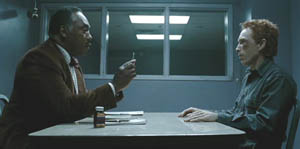|
From the beginning, Watchmen was a nightmare to get into production. The source material was long and dense, and unlike most superhero stories, didn't feature a character or characters who could be dropped into any one of many possible adventure scenarios. Watchmen was a self-contained novel with no spinoffs or sequels. Its story was hardly the fare the average filmgoer associates with comic book films, even in light of last year's highly successful The Dark Knight. Its narrative is rife with subtext and subtleties. This being so, it might seem a mismatch that Zack Snyder, known for his overblown, trendy-in-excess style, would be the one to ultimately helm the material, but he did get it made, and did so without gutting the story of its themes or maturity, and for that, one should be thankful. Parts of it he gets quite well: the story is rooted in the idea of nostalgia, perhaps even more so now that the 1980s are twenty years old at their most recent. Snyder's music choices are broad, the kind one marks a year with in memory, which work better than subtler choices, with less-obvious period resonances, might have done. At the same time, it's about the falsity of nostalgia; after all, no one ever actually experienced this version of the past, and the one they did experience is probably little like the memory it formed. As the first Silk Specter reflects, we tend to idealize our pasts, even to the point of dismissing the darker parts. 
In other respects, Snyder goes too broad. The violence, already amped up from the comic, gets even more excessive in the Director's Cut. The film's incarnation of Richard Nixon looks so much more like a political cartoonist's caricature of Tricky Dick that it's hard to be sure that it wasn't intentional. The novel's slower, more thoughtfully-paced sequences often get rushed through; I expect that if all the slow-mo scenes got turned back into normal speed, there would have been plenty of room for the more artful revelation of the Comedian's identity, or of the nihilistic meaning behind Rorshach's mask. Both the scenes do get more room to breathe in the Director's Cut, and we get closure to the story of original Nite Owl Hollis Mason, in case anyone was wondering just what the old guy was doing in the film. Despite the needless extra gore, it's overall a superior cut to the theatrical one, though it passes up the chance to incorporate the JFK quote that gave the original work its name, which never referred specifically to the crimefighting heroes. It would be nice to be able to report that the Ultimate Cut, which interpolates the animated Tales of the Black Freighter story, is the best version of all. Often confusing in intent to many readers of the comic, Black Freighter was a brilliant piece of self-critiquing allegory, a comic book story within the comic, in which a protagonist faces a challenge similar to that of Watchmen's villain (or hero, depending upon your perspective) and comes to an opposite moral conclusion. The story wove in and out of the main narrative, offering commentary on its events and perspectives, ultimately giving a counterpoint to the cold, Machiavellian logic of the primary story's conclusion. In its absence, the film had shied away from the comic's more overt endorsement of the horrifying final solution, as there was nothing else on hand to offer a rebuttal. Unfortunately, as with many readers, Snyder seemed to be unclear on the story-in-a-story's role or function. 
Nearly all of the Black Freighter sequences have been moved in relation to the primary narrative's events, and furthermore, they come in large, unbroken chunks, instead of fluidly moving in and out of scenes shared with the live-action portion of the film. What this means is that not only do the animated bits seem to stop the story in its tracks, they also fail to provide the same commentary as they did originally, since the comments were quite scene-specific and yet no longer align with the same parts as in the novel. Only the final of Freighter's sequences is placed so as to make the proper point, yet its efficacy is undercut by its positioning in the worst possible place in terms of dramatic pacing. Imagine Darth Vader revealing his big secret to Luke, only for the film to cut away to a scene detailing whether or not C-3PO's legs have been screwed back on before Luke even gets to yell "Noooo!" It's one of the most ill-conceived pieces of structuring I've seen in a film of this calibre, and instead of adding to the drama, as was the obvious intent, the whole things sinks at the eleventh hour from the weight of it. Add to that the fact that the character of Veidt no longer makes reference to his dream of the comic, and its role as his conscience vanishes altogether, making the whole thing pretty pointless. Some things just don't translate well between mediums, and while this is clearly one of them, it still could have come off much better than it did. Despite missteps, Watchmen is not a film to be casually dismissed. This is a serious work with great attention to detail, interesting characters and plenty of meat on its bones. If Snyder sometimes gets carried away with grandiose "Watch me as I make this movie!!" gestures and leaves some subtext so darned "sub" that it never gets noticed, it's just because he's not operating at the level of the original author. Few are. If Watchmen the movie didn't quite have the startling impact of Watchmen the comic, it's doubtlessly because filmdom is full of classics already, the industry not having been mired for decades in making disposable junk for children. I can think of no other film that had the guts to tackle the God question and come to any conclusion other than vidication of the popular view, no other film that gloriously declared that the subtleties and intracacies of human nature are quite miraculous enough without any appeal to actual divinity. The Ultimate cut must be applauded for, if nothing else, taking this point even further. But for the best experience (sans reading it), go with the middle cut. It's not quite perfect, but if you expect perfection, you expect way too much. This film is quite good, which is quite good enough. -review by Matt Murray
|
|
||||||||